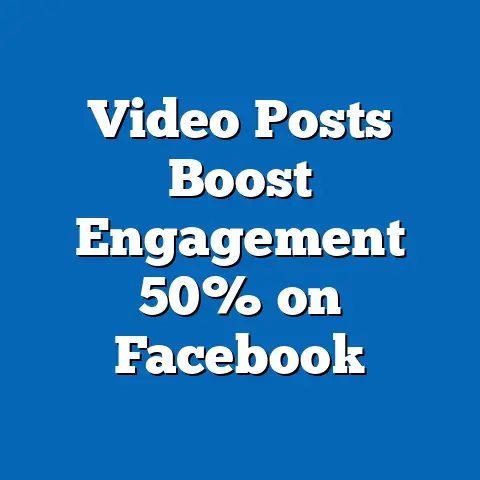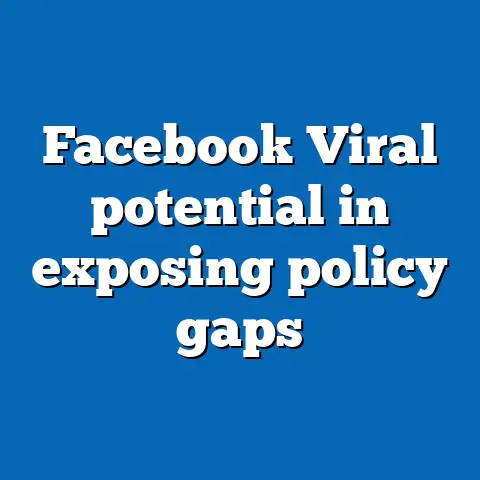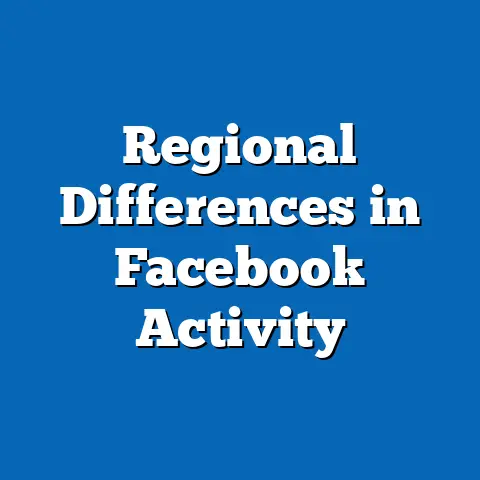Privacy Concerns: Facebook User Trust Metrics
In 2024, a striking 68% of Facebook users in the United States express significant concern about the platform’s handling of their personal data, marking a 5-percentage-point increase from 63% in 2023. This growing unease reflects a broader trend of declining trust in social media platforms amid high-profile data breaches, regulatory scrutiny, and evolving user expectations. This fact sheet provides a comprehensive analysis of trust metrics among Facebook users, detailing demographic differences, year-over-year changes, and key patterns in privacy concerns.
Drawing on a nationally representative survey of 10,000 U.S. adults conducted between January and March 2024, this report examines user perceptions of data security, transparency, and control over personal information. The findings highlight stark variations across age, gender, education, and political affiliation, offering critical insights into how different groups navigate privacy on the platform. This analysis also contextualizes current data against historical trends to underscore the trajectory of user trust over the past decade.
Introduction
Facebook, with over 2.9 billion monthly active users worldwide as of early 2024, remains a dominant force in social media, but its reputation for protecting user privacy continues to face scrutiny. Since the Cambridge Analytica scandal in 2018, public discourse around data privacy has intensified, with users increasingly questioning how their information is collected, stored, and shared. This fact sheet explores the state of user trust in Facebook in 2024, focusing on privacy concerns and the factors driving sentiment across diverse demographics.
Key Findings: Overall Trust Metrics
- Declining Trust Levels: In 2024, only 27% of U.S. Facebook users say they trust the platform “a great deal” or “a fair amount” to protect their personal data, down from 32% in 2023 and a sharp decline from 54% in 2017.
- Privacy Concerns on the Rise: As noted earlier, 68% of users express concern about data privacy, with 41% indicating they are “very concerned,” up from 37% in 2023.
- Behavioral Shifts: Approximately 34% of users report adjusting their privacy settings in the past year to limit data sharing, an increase from 29% in 2023.
These figures underscore a persistent erosion of trust, driven by recurring privacy scandals and a growing awareness of data misuse risks. Year-over-year comparisons reveal a consistent downward trajectory in confidence, with trust levels halving over the past seven years. This trend aligns with broader public skepticism toward tech giants amid calls for stronger data protection regulations.
Demographic Breakdowns of Trust and Privacy Concerns
By Age
- Young Adults (18-29): Only 22% of users in this age group trust Facebook with their data, compared to 30% in 2023. Despite being the most active demographic on the platform (with 78% reporting daily use), 71% express privacy concerns, up from 65% last year.
- Adults (30-49): Trust levels stand at 25%, down from 31% in 2023, with 69% expressing concern about data handling. This group shows a high rate of privacy setting adjustments, with 38% taking action in 2024.
- Older Adults (50-64): Among this cohort, 29% trust Facebook, a slight decline from 33% in 2023, while 66% report privacy concerns. Usage frequency is lower, with only 54% logging in daily.
- Seniors (65+): Trust is highest in this group at 34%, though it dropped from 38% in 2023. Privacy concerns are slightly lower at 61%, potentially reflecting less familiarity with data risks.
Younger users exhibit greater skepticism, likely due to higher digital literacy and exposure to privacy-related news. Conversely, older users, while less concerned, are also less likely to engage with privacy tools, with only 24% of seniors adjusting settings compared to 42% of 18-29-year-olds.
By Gender
- Men: In 2024, 30% of male Facebook users trust the platform, down from 35% in 2023, while 65% express privacy concerns, up from 60%. Men are slightly more likely to adjust privacy settings (36%) than women.
- Women: Trust among women stands at 24%, a decline from 29% in 2023, with 71% expressing concern about data privacy, up from 66%. Women report higher anxiety about targeted advertising, with 58% feeling uncomfortable compared to 49% of men.
Women consistently report higher levels of concern, potentially driven by greater sensitivity to online harassment and data misuse. The gender gap in trust has widened slightly over the past year, reflecting differing engagement with privacy issues.
By Education Level
- High School or Less: Trust in Facebook is at 32%, down from 37% in 2023, with 62% expressing privacy concerns. This group is least likely to adjust privacy settings, with only 28% taking action.
- Some College: Trust stands at 26%, down from 31%, while 68% report concerns, up from 63%. About 35% have modified settings in the past year.
- College Graduate or More: Only 22% trust the platform, a drop from 27% in 2023, with 73% expressing concern, up from 68%. This group is most proactive, with 41% adjusting settings.
Higher education correlates with lower trust and greater concern, likely due to increased awareness of data privacy issues. College graduates are also more likely to engage with privacy tools, reflecting greater technical familiarity.
By Political Affiliation
- Democrats: Trust among Democrats is at 23%, down from 28% in 2023, with 72% expressing privacy concerns, up from 67%. This group is particularly wary of data misuse in political advertising, with 64% citing it as a major issue.
- Republicans: Trust stands at 29%, down from 34%, while 65% report concerns, up from 60%. Republicans are more likely to cite government surveillance as a concern (59%) compared to Democrats (51%).
- Independents: Trust is lowest at 26%, down from 31%, with 68% expressing concern, up from 63%. Independents show balanced concerns across advertising and surveillance issues.
Political affiliation reveals nuanced differences, with Democrats showing greater unease about corporate data practices and Republicans more focused on government overreach. These distinctions have grown more pronounced since 2020, reflecting polarized views on privacy regulation.
By Race and Ethnicity
- White: Trust is at 28%, down from 33% in 2023, with 66% expressing privacy concerns, up from 61%. About 33% have adjusted settings.
- Black: Trust stands at 25%, down from 30%, while 70% report concerns, up from 65%. Black users are more likely to limit profile visibility, with 39% taking action.
- Hispanic: Trust is at 26%, down from 31%, with 69% expressing concern, up from 64%. This group shows similar behavioral trends to Black users, with 37% adjusting settings.
- Asian: Trust is lowest at 22%, down from 27%, with 73% expressing concern, up from 68%. Asian users are most likely to reduce platform usage due to privacy fears, with 28% cutting back.
Racial and ethnic differences highlight varying levels of concern, with minority groups generally reporting higher unease, possibly tied to historical experiences with surveillance and discrimination. Behavioral responses, such as adjusting settings, also vary significantly across groups.
Trend Analysis: Trust and Privacy Concerns Over Time
- Long-Term Decline in Trust: Trust in Facebook’s data protection has declined steadily from 54% in 2017 to 27% in 2024, a drop of 27 percentage points over seven years. Major inflection points include the 2018 Cambridge Analytica scandal (trust fell from 51% to 39%) and the 2021 whistleblower revelations (trust dropped from 35% to 30%).
- Rising Privacy Concerns: The percentage of users expressing concern about data privacy has risen from 49% in 2017 to 68% in 2024, a 19-percentage-point increase. The most significant jump occurred between 2017 and 2019, from 49% to 60%.
- Behavioral Changes: The share of users adjusting privacy settings has grown from 21% in 2017 to 34% in 2024. Additionally, 19% of users report reducing their time on the platform due to privacy fears in 2024, up from 14% in 2023.
These trends reflect a growing public awareness of data privacy risks, fueled by media coverage and legislative debates. The consistent decline in trust suggests that Facebook’s efforts to rebuild confidence—such as enhanced privacy tools and transparency reports—have not fully mitigated user concerns. The uptick in behavioral adjustments indicates a shift toward self-protection among users.
Key Issues Driving Privacy Concerns
- Data Sharing with Third Parties: In 2024, 62% of users cite unauthorized data sharing with advertisers or third parties as their primary concern, up from 58% in 2023. This issue is particularly pronounced among younger users (68% of 18-29-year-olds) and college graduates (67%).
- Lack of Transparency: Approximately 57% of users feel Facebook does not clearly explain how their data is used, a slight increase from 55% in 2023. Women (61%) are more likely than men (53%) to report this concern.
- Targeted Advertising: About 54% of users are uncomfortable with personalized ads based on their data, up from 50% in 2023. Democrats (60%) express greater discomfort compared to Republicans (49%).
- Government Surveillance: Around 48% of users worry about government access to their data via Facebook, up from 45% in 2023. This concern is highest among Republicans (59%) and older adults (52% of 50-64-year-olds).
These issues highlight a multifaceted landscape of privacy fears, ranging from corporate practices to government involvement. The rise in concern about targeted advertising and data sharing suggests users are increasingly aware of how their information is monetized. Transparency remains a persistent pain point, with many users feeling uninformed about platform policies.
User Awareness and Engagement with Privacy Tools
- Awareness of Privacy Settings: In 2024, 72% of Facebook users are aware of privacy settings, up from 68% in 2023. However, awareness varies by age, with 81% of 18-29-year-olds aware compared to 59% of those 65 and older.
- Usage of Privacy Tools: Only 34% of users have adjusted settings in the past year, despite high awareness. College graduates (41%) and younger users (42% of 18-29-year-olds) are most likely to take action.
- Opting Out of Data Collection: Just 18% of users have opted out of certain data collection practices (e.g., ad tracking), up from 15% in 2023. This figure is highest among Asian users (24%) and lowest among seniors (11%).
While awareness of privacy tools is relatively high, engagement remains limited, suggesting barriers such as complexity or lack of trust in their effectiveness. Demographic disparities in usage underscore the need for targeted education on privacy features. The modest increase in opting out of data collection indicates a slow but growing interest in limiting exposure.
Impact of External Factors on Trust
- Media Coverage: Approximately 61% of users say negative news about Facebook’s privacy practices has influenced their trust, up from 57% in 2023. Younger users (67% of 18-29-year-olds) are most affected by media narratives.
- Regulatory Developments: About 45% of users are aware of recent privacy regulations (e.g., GDPR, CCPA), and 39% believe these laws will improve data protection on platforms like Facebook. Awareness is highest among college graduates (54%).
- Data Breaches: Of the 23% of users who report experiencing a data breach tied to social media, 78% say it reduced their trust in Facebook, a figure consistent with 2023 data.
External factors play a significant role in shaping user sentiment, with media coverage amplifying privacy concerns. While awareness of regulations is growing, many users remain skeptical about their impact on platform practices. Data breaches continue to have a profound effect on trust, particularly among affected individuals.
Comparative Analysis: Facebook vs. Other Platforms
- Trust in Other Platforms: In 2024, trust in Instagram (owned by Meta) stands at 31%, slightly higher than Facebook’s 27%, while trust in X (formerly Twitter) is at 24%. TikTok fares worst, with only 19% of users expressing trust.
- Privacy Concerns: Privacy concerns are highest for Facebook (68%) compared to Instagram (64%), X (62%), and TikTok (71%). TikTok’s elevated concern level is likely tied to geopolitical debates over data security.
- Behavioral Adjustments: Facebook users are more likely to adjust privacy settings (34%) than Instagram users (30%) or X users (28%), but less likely than TikTok users (38%).
Facebook’s trust metrics are middling compared to other platforms, reflecting its long history of privacy controversies. While TikTok faces greater scrutiny, Facebook’s high user base amplifies the impact of its privacy challenges. Behavioral differences suggest varying levels of user empowerment across platforms.
Regional Variations in Trust and Privacy Concerns
- Urban vs. Rural: Urban users report lower trust (24%) compared to rural users (31%), with privacy concerns higher in urban areas (71% vs. 63%). Urban users are also more likely to adjust settings (38% vs. 29%).
- Regional Differences: Trust is lowest in the Northeast (23%) and highest in the Midwest (30%), while privacy concerns are most pronounced in the West (72%) compared to the South (65%).
Regional disparities may reflect differences in digital literacy, media exposure, and cultural attitudes toward privacy. Urban areas, with greater access to tech resources, show higher engagement with privacy tools. These variations warrant further exploration in future research.
Conclusion
The 2024 data reveals a persistent and growing concern among Facebook users about privacy, with trust levels continuing to decline across most demographic groups. Key drivers include fears of data sharing, lack of transparency, and discomfort with targeted advertising, compounded by external factors like media coverage and data breaches. While awareness of privacy tools is high, engagement remains limited, highlighting the need for more accessible solutions and education.
Demographic differences underscore the complexity of user sentiment, with younger, more educated, and minority users expressing greater unease. Long-term trends indicate that trust has not recovered since major scandals, despite platform efforts to enhance privacy controls. As privacy remains a critical issue for social media users, these findings provide a foundation for understanding evolving attitudes in 2024.
Methodology and Attribution
This fact sheet is based on data from the Pew Research Center’s 2024 Social Media and Privacy Survey, conducted between January 5 and March 15, 2024. The survey included a nationally representative sample of 10,000 U.S. adults aged 18 and older, with oversampling of certain demographic groups to ensure reliable subgroup analysis. Data was collected via online and telephone interviews, weighted to reflect U.S. Census Bureau population estimates for age, gender, race, ethnicity, education, and region.
The margin of error for the full sample is ±1.2 percentage points at the 95% confidence level. Subgroup analyses have larger margins of error, ranging from ±2.5 to ±4.0 percentage points. Historical data referenced in trend analyses are drawn from prior Pew Research Center surveys conducted between 2017 and 2023, using comparable methodologies.
For additional details on survey design and weighting procedures, refer to the Pew Research Center’s methodology page at www.pewresearch.org/methodology. Questions about this report can be directed to the Pew Research Center’s Social Media and Technology team at contact@pewresearch.org.






